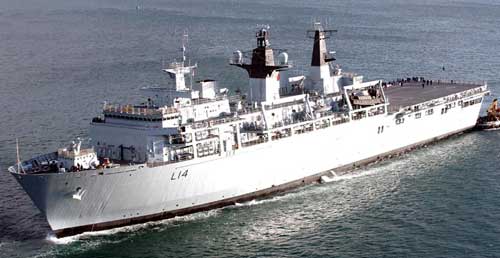Albion-klassen LPD 
 |
Deplacement:
18.500/21.500 tons Dimensioner: 176 x 28,9 x 6,1 m Fart: 18 knob Besætning: 325 mand Bevæbning: 2 30mm Goalkeeper CIWS, 2 20mm maskinkanoner, 4 stillinger til maskingeværer Nyttelast: 305 mand+405 (overlast) |
Storbritannien: 2
| Navn | Køllagt | Søsat | Tjeneste | Noter |
| L14 Albion | 22-5-98 | 9-3-01 | 19-6-03 | Devonport |
| L15 Bulwark | 27-1-00 | 15-11-01 | 28-4-05 | Devonport |
JDW 11/01: Det amfibiske angrebsfartøj HMS Albion blev søsat 9/3/01 ved BAE Systems marine værftet, Barrow-in-Furness. Klasse skal afløse de eksisterende fartøjer HMS Fearless og HMS Intrepid.
JDW 45/01: HMS Bulwark, den anden af to 18.500 tons LPD(R) til Royal Navy, blev søsat fra BAE Systems Marine, Barrow-in-Furness, 15/11/01. Det første skib, HMS Albion, kommer i tjeneste 1/03 for at afløse HMS Fearless. De to skibe kan hver medføre op til 700 marinesoldater, 8 landgangsfartøjer og en blanding af køretøjer inkl. op til 6 Challenger 2 kampvogne eller omkring 30 nye Viking terrængående køretøjer.

HMS ALBION TECHNICAL SPECIFICATION
Military Lift:
Vehicle deck capacity for up to six Challenger 2 tanks or around 30 armoured all-terrain tracked carriers.
Floodable well dock, with the capacity to take either four utility landing craft (each capable of carrying a Challenger 2 tank) or shelter a US hovercraft landing craft.
Four smaller landing craft on davits, each capable of carrying 35 troops.
Two-spot flight deck able to take medium support helicopters and stow a third. Deck is capable of taking Chinook. The Albion design does not have a hangar but does have equipment needed to support aircraft operations such as Flight Service Control, Ground Support Equipment, Handlers/Maintainers Ready Room, and an Aircrew Briefing Room.
Propulsion:
Integrated
Electric, driving two shafts
Motors:
two 6 megaWatt, Synchro-converter Drives.
Two Wartsilla 6.25MegaWatt Generators
108KW
Bow Thruster
Self
defence:
Two Kelvin Hughes 1007 radars, plus Type 996 surveillance radar
Two Goalkeeper Close In Weapon Systems
Seagnat Decoy system
UAT Electronic Warfare system